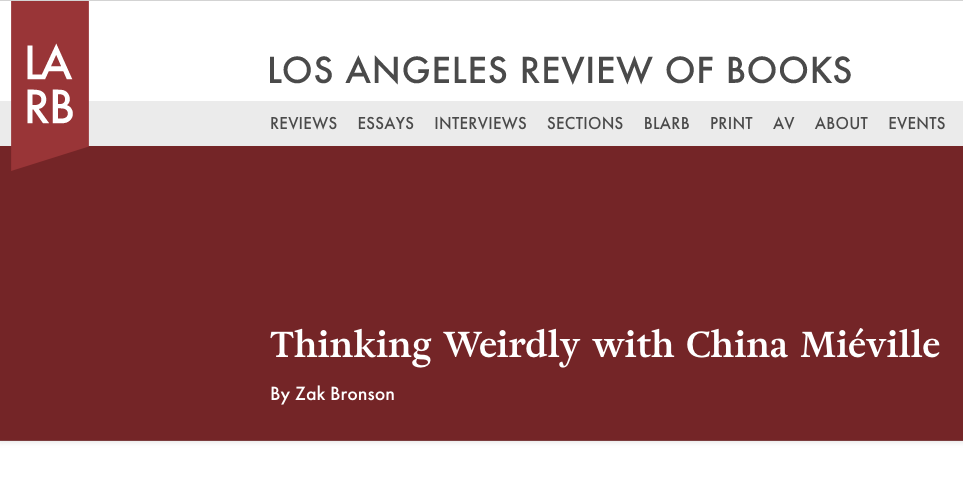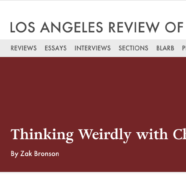LARB Review
 The Los Angeles Review of Books recently published a review article of China Miéville: Critical Essays, the collection I co-edited for Gylphi published in 2015. Gylphi also published Carl Freedman's excellent Art and Idea in the Novels of China Miéville, which was also reviewed in "Thinking Weirdly with China Miéville" by Zak Bronson. Bronsen's article begins by asserting Miéville's importance as a leading contemporary writer whose generic boundary-crossing and sheer inventiveness not only suggest a new aesthetic for the 21st century but, perhaps more importantly, assert a political intervention into what Mark Fisher called capitalist realism. As Bronsen quotes Fisher: “the widespread sense that not only is capitalism the only viable political and economic system, but also that it is now impossible to even imagine a coherent alternative to it.”
The Los Angeles Review of Books recently published a review article of China Miéville: Critical Essays, the collection I co-edited for Gylphi published in 2015. Gylphi also published Carl Freedman's excellent Art and Idea in the Novels of China Miéville, which was also reviewed in "Thinking Weirdly with China Miéville" by Zak Bronson. Bronsen's article begins by asserting Miéville's importance as a leading contemporary writer whose generic boundary-crossing and sheer inventiveness not only suggest a new aesthetic for the 21st century but, perhaps more importantly, assert a political intervention into what Mark Fisher called capitalist realism. As Bronsen quotes Fisher: “the widespread sense that not only is capitalism the only viable political and economic system, but also that it is now impossible to even imagine a coherent alternative to it.”
It's great to see scholarship on Miéville's writing getting the attention it deserves and I was particularly pleased with Bronsen's positive review of our edited collection:
In many ways, Edwards and Venezia’s China Miéville: Selected Essays picks up where Art and Idea leaves off by considering Miéville’s novels within the realm of Marxist literary criticism, while also opening up alternate approaches to reading his fiction. The collection begins with a preface by Miéville that ruminates on disavowed literature. This is followed by an introduction by Edwards and Venezia — or what they call an “unintroduction” — which provides a magisterial overview of Miéville’s works. Their lengthy and comprehensive essay begins with a discussion of Miéville’s connections to Marxism and the New Weird, then reads his work in line with post-genre theory, the grotesque, actor-network-theory, Surrealism, and the “psychogeography” of the Situationists. Their introduction is also notable for discussing several of Miéville’s lesser-known works, including his short stories and his nonfiction booklet London’s Overthrow. As one of the most complete and thorough introductions to Miéville’s work, I believe that it will provide valuable insights to both new and longtime fans.
You can read Zac Bronsen's article in full on the Los Angeles Review of Books website.
An earlier review of China Miéville: Critical Essays and Freedman's Art and Idea in the Novels of China Miéville was actually published by Rhys Williams in a 2016 issue of Foundation. As Williams suggested, "[t]he publication of two books in one year devoted entirely to the work of one young author – the first a monograph by a key authority on sf, the second a collection edited by two of the rising stars of the field – speaks volumes about the importance of China Miéville in the world of fantastic literature." Williams praised our "weighty introduction" to the edited collection, despite what he considered to be the unnecessary framing of the piece as a Miévillean "UnIntroduction," concluding that:
It lays groundwork important for any reading of Miéville – groundwork that the collection’s essays do not necessarily touch on, and so all the more valuable for that. It covers the Miéville-Suvin theoretical debate, the importance of London (and other cities) to the author, psychogeography, hybridity and the grotesque, genre and genre-blending, and the Weird tradition. It goes some way towards framing Miéville in the Marxist tradition that is so crucial an influence, draws important links between his work and post-1999 Seattle politics, and rather ingeniously uses the figure of ‘breach’ to illuminate his oeuvre, both fictional and critical. It ends with a thorough overview of each contribution and stands, I think, as one of the best, short Miéville 101’s available.
You can read Rhys Williams' full review for Foundation here.







 Dr Caroline Edwards is Senior Lecturer in Modern & Contemporary Literature at Birkbeck, University of London. Her research and teaching specialisms are in 21st century literature and critical theory, science fiction and post-apocalyptic narratives, Marxist aesthetics, and utopianism.
Dr Caroline Edwards is Senior Lecturer in Modern & Contemporary Literature at Birkbeck, University of London. Her research and teaching specialisms are in 21st century literature and critical theory, science fiction and post-apocalyptic narratives, Marxist aesthetics, and utopianism.
Follow / Contact